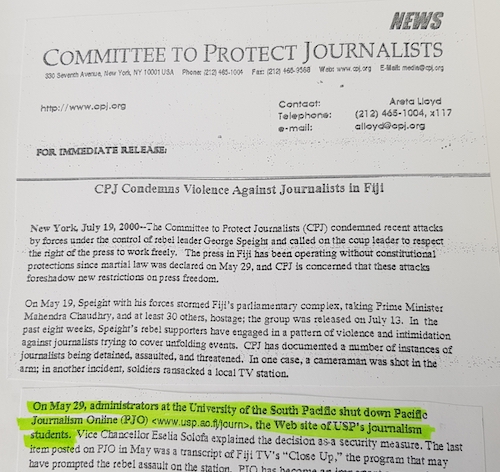By Mithleshni Gurdayal
Journalism students at the University of the South Pacific have expressed dismay over the forced shutdown of their website, Pacific Journalism Online (PJO), by the university vice-chancellor Esekia Solofa.
Vice-chancellor Solofa instructed the website to be shut following the attack on Fiji Television by a mob on May 22.
The website is used by second year students for practical assignments and internet classes. The website also hosted Wansolwara, the newspaper put together by journalism students.
- READ MORE: Pacific freedom of the press: Case studies in independent campus-based media models
- Frontline reporters: A students’ internet coup
- Baptism of fire: How journalism students from the University of the South Pacific covered the Speight putsch and its aftermath
- Crisis coverage by University of the South Pacific journalism students
- USP student coverage of the ‘internet coup’ in Fiji 2000 [Archive]
Online editor Christine Gounder said: “USP’s action was unacceptable and poses a serious threat to media and academic freedom.

“It is disappointing and disturbing. It was a sudden decision made by the university and we, the journalism students, were not consulted on the matter,” she said.
Wansolwara editor Reggie Dutt also slammed the university’s decision, saying that the vice-chancellor had acted in haste.
“USP’s action is in violation of media freedom and portrays hypocrisy. It would have been better if the students and the lecturer were consulted before shutting us off.
“We were just gaining popularity but now we are cut off,” he said.
“The sad thing is that we are not even being given a formal explanation on the matter.”
International press agencies and journalism schools have also criticised the university’s decision to shut the website and most have described this action as “gagging media”.
Frontline Reporters: USP student reportage of 2000 Fiji coup. Video: Café Pacific/USP Journalism
Professor John Henningham, head of the University of Queensland journalism department, said such an act was a strike at the heart of press and media freedom.
“Suspension of a news and information-based website is equivalent to closing down a newspaper or TV station and clearly breaks the most fundamental principles of press freedom to which all journalists are pledged.”
David Venables, president of the Journalism Education Association of New Zealand, said it was important that media organisations and universities everywhere did not compromise freedom of speech or press freedom and cave into threats of violence.
Meanwhile, a spokesperson for the university administration that the vice-chancellor was “only taking precautions” [in view of the attempted coup situation in Fiji].
She said the VC was mindful not to be caught up in the crossfire during the political crisis.
USP journalism coordinator David Robie’s account of the website shutdown on 29 May 2000 and later reopening during the crisis as published in Pacific Journalism Review.

